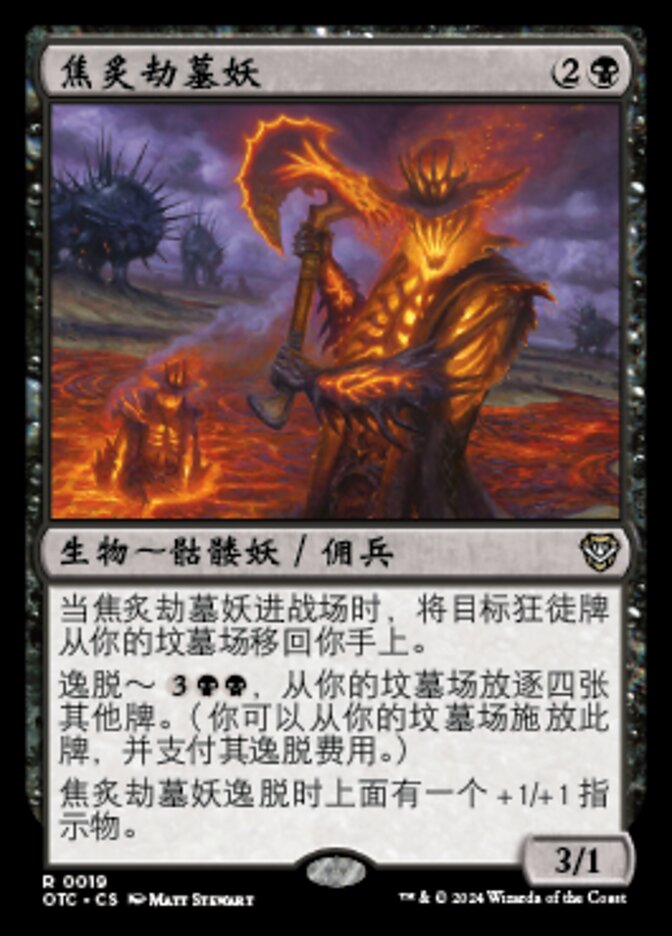
焦炙劫墓妖 {2}{B}
生物 — 骷髅妖/佣兵
当焦炙劫墓妖进战场时,将目标狂徒牌从你的坟墓场移回你手上。
逸脱~{3}{B}{B},从你的坟墓场放逐四张其他牌。(你可以从你的坟墓场施放此牌,并支付其逸脱费用。)
焦炙劫墓妖逸脱时上面有一个+1/+1指示物。
3/1
Illustrated by Matt Stewart
- Standard
- Not Legal
- Alchemy
- Not Legal
- Pioneer
- Not Legal
- Explorer
- Not Legal
- Modern
- Not Legal
- Historic
- Not Legal
- Legacy
- Legal
- Brawl
- Not Legal
- Vintage
- Legal
- Timeless
- Not Legal
- Commander
- Legal
- Pauper
- Not Legal
- Oathbreaker
- Legal
- Penny
- Not Legal
Toolbox
Buy This Card
Notes and Rules Information for 焦炙劫墓妖:
- Only the English version of a Magic card receives Oracle updates and errata. View this card in English. (Scryfall note)
- Escape’s permission doesn’t change when you may cast the spell from your graveyard. (2024-04-12)
- To determine the total cost of a spell, start with the mana cost or alternative cost you’re paying (such as an escape cost), add any cost increases, then apply any cost reductions. The mana value of the spell remains unchanged, no matter what the total cost to cast it was and no matter whether an alternative cost was paid. (2024-04-12)
- After an escaped spell resolves, it returns to its owner’s graveyard if it’s not a permanent spell. If it is a permanent spell, it enters the battlefield and will return to its owner’s graveyard if it dies later. Perhaps it will escape again—good underworld security is so hard to come by these days. (2024-04-12)
- If a card has multiple abilities giving you permission to cast it, such as two escape abilities or an escape ability and a flashback ability, you choose which one to apply. The others have no effect. (2024-04-12)
- If you cast a spell with its escape permission, you can’t choose to apply any other alternative costs or to cast it without paying its mana cost. If it has any additional costs, you must pay those. (2024-04-12)
- If a card with escape is put into your graveyard during your turn, you’ll be able to cast it right away if it’s legal to do so, before an opponent can take any actions. (2024-04-12)
- Once you begin casting a spell with escape, it immediately moves to the stack. Players can’t take any other actions until you’re done casting the spell. (2024-04-12)
- A card, spell, or permanent is an outlaw if it has the Assassin, Mercenary, Pirate, Rogue, or Warlock creature type. It doesn’t matter if it has more than one of those creature types; as long as it has at least one, it’s an outlaw. (2024-04-12)
- Outlaw is not a creature type. If an effect asks you to choose a creature type, you can’t choose outlaw. (2024-04-12)
- If an ability refers to an outlaw or whether a player controls an outlaw, it’s referring only to permanents with one or more of the creature types specified above. Notably, it’s not referring to any spell or card not on the battlefield. However, other abilities may refer to an “outlaw spell” or “outlaw card” in a zone other than the battlefield. Those abilities refer to spells and cards with one or more of the specified creature types. (2024-04-12)